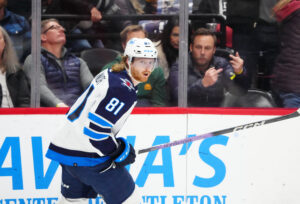New Year’s Eve, 2010. The Detroit Red Wings were back in a familiar spot, best in the Western Conference. However, they were trailing 3-2 in the third period to the New York Islanders, who were 26 points behind Detroit in the standings going into that night’s contest. Needing a spark, the then 20-year-old who was drafted just one year before, 60th overall in the 2009 Entry Draft, got his stick on one for his first goal in the league.
He made sure everyone knew it.
Though Detroit would go on to lose the contest and Tatar would go back down after a nine-game stint, his youthful exuberance was evident and was a first sign of where the Red Wings as a team would be going. Nicklas Lidstrom was still there. Brian Rafalski was still there. Pavel Datsyuk, Tomas Holmstrom, Kris Draper, Jiri Hudler, Johan Franzen, and Valtteri Filppula were still there. In terms of the new, skilled core that is seen today, Tatar was the first to dip his feet among players like Gustav Nyquist, Tomas Jurco, and Riley Sheahan.
Now entering his prime at 26 with a solid pedigree behind him to begin his career as one of the clear top performers on the team, it’s time to pay up.
Before we begin, here is a nice rundown of arbitration done by Capfriendly.
With Arbitration hearings scheduled to start today, here are few key points to remember, & the link to our Arb page: https://t.co/YAOHlLeC3V pic.twitter.com/PRdETR15KW
— CapFriendly (@CapFriendly) July 20, 2017
Tomas Tatar Arbitration Case Will Define Detroit Red Wings Outlook on Future
Since 2013-14 when he took over as a regular for the first time, his 94 goals is 34th among all forwards and he’s scored at least 20 goals in the past three campaigns, being the only one on the team to reach the mark last year. The analytics back up his importance to the team, as since 2013 in 318 games, his 55.4% Corsi-for percentage ranks 17th overall in the league among skaters including a 45.40 Corsi-against per 60 minutes.
Apparently, at least to start negotiations, this is worth less than Justin Abdelkader‘s average salary of $4.25 million. It is just a starting offer, but it comes off as a weak beginning considering the over-payment that has taken place recently with much less talented assets.
Tatar (DET): Club offer is $4.1M. Player ask is $5.3M
— Elliotte Friedman (@FriedgeHNIC) July 18, 2017
The bright side of Tatar’s ask is that it is down from reports that included an excess of $6 million and up to seven years. What remains to be seen is if that is a one-year option or if it’s a number Tatar will be comfortable with over a five-year spread. This is where the crossroad foundation gets laid for an intriguing 360 that general manager Ken Holland would have to take from his supposed “plan” that not many in Detroit have faith in. That plan involves a playoff game at Little Caesar’s Arena this coming season.
Sign the Multi-Year Deal, Stay the Course
If Tatar comes out of this with, say, a five-year contract at a figure around $5 million before the hearing, which is what he is worth with his body of work on a less than subpar team with other less than impressive players getting hometown pay raises, the beat will go on. Arbitration cases usually get settled in the eleventh hour, like Danny DeKeyser and Petr Mrazek‘s deals last season. Holland will try to compete and bank on comeback seasons from players that he counted on for bounce-back seasons last year.
Purgatory on account of a shiny new building will continue on account of one of Detroit’s top and most recognizable forwards being under control and secure for years to come, despite the rational idea to rebuild. Who knows, Tatar could figure it out and carry the team reaching upwards of 30 goals over the contract, and Detroit looks better in that regard, although highly unlikely. Detroit stays the course if this happens. Although it’s not the desired course of action even with Tatar in the fold, this will be the route the organization takes with a marketable, but not elite, franchise favorite.
Sign the One-Year Deal, The Other Scenario
However, if it reaches arbitration and results in a one-year deal, things get interesting not only for the young forward, but the organization itself. Tatar has hinted at least testing the market, if not leaving entirely, should it come to that point. The chance for an extension lowers and lowers as the season goes on. This offers another opportunity to finally declare something with the substance of a rebuild (cue the collective gasp), and trading Tatar would accelerate it.
For context, rental forward Patrick Eaves got the Dallas Stars a conditional second round pick at the deadline that turned into a first and eventually through a trade with Chicago, Jake Oettinger. and Brayden Schenn netted two first round picks at the Entry Draft this year, albeit through a salary dump of Jori Lehtera. A young forward like this should net nothing less than a first round pick and defensive prospect or two that the team desperately needs, depending on the time of the deal.
Though Tatar is a proven 20-goal scorer that would likely touch 30 with a seriously contending team around him, all would not be lost with Detroit’s two guns up their sleeve in Anthony Mantha and Evgeny Svechnikov. One has already flirted with 20 goals with his first full season being last year all while being a possession machine, and the other is projected to be another hulking winger with a supreme shot that lines up on the left side with Mantha on the right. The chance to increase the odds of getting a premier defensive aid to a blueline that has astoundingly crumbled over the years is there.
Of course, even with the unclear future posed by Tatar’s stance, Holland on the surface may not be phased and look to continue the process of putting fans in the seats capitalizing on the glow and glamour of the new pizza palace and its highly publicized state-of-the-art scoreboard that sadly will be more impressive than the team that will be displayed on it.
But reality will start to set in.
Mike Green, the only experienced ounce of offense he has on that blueline, will be gone at the 2018 deadline. The Jimmy Howard/Petr Mrazek decision still has to be made. Niklas Kronwall‘s going to be on long-term injured reserve sooner rather than later, and Jonathan Ericsson could be joining him with his hip issue. Henrik Zetterberg is another year older. It sounds like a broken record from the past few years at this point.
There are no clear-cut elite difference makers on the team or in the system up front, as of yet. It remains to be seen if Dylan Larkin, Mantha, or even Andreas Athanasiou can be leaned on consistently as they are still quite short in the tooth. Tatar may not think carrying the team on his back to a first round exit or worse through each year in his deal is appetizing unless he’s paid as such. Who could blame him?
Conclusion
it is depressing to think of Tatar and his scoring being gone by as early as next season, but if it comes to that point in this hearing, the ability to gain major assets for him provides a worthy consolation. At the end of the process Detroit will go through with or without him, he’ll be in his thirties and there’s no guarantee he’ll keep up his production in time for when the team is ready to compete again. There’s no guarantee Detroit’s rebuild will be completed by then either with the financial hell they are in for the next few years.
It is something for Holland to think about, entering the final season of his deal, on other avenues that could be opened if Tatar chooses not to stay long-term. That his team isn’t all that competitive; That Trevor Daley or Luke Witkowski won’t make a difference on whether the team makes or misses the playoffs; That the players that he is counting on to bounce back may never bounce back and become elite; That the glory days are over and a new era of pain should begin.
Tatar wants to be paid and is letting you and everyone else know it. What remains to be seen is the result that will be key in either retooling or rebuilding.
It’s Holland’s move.
Main Photo:






